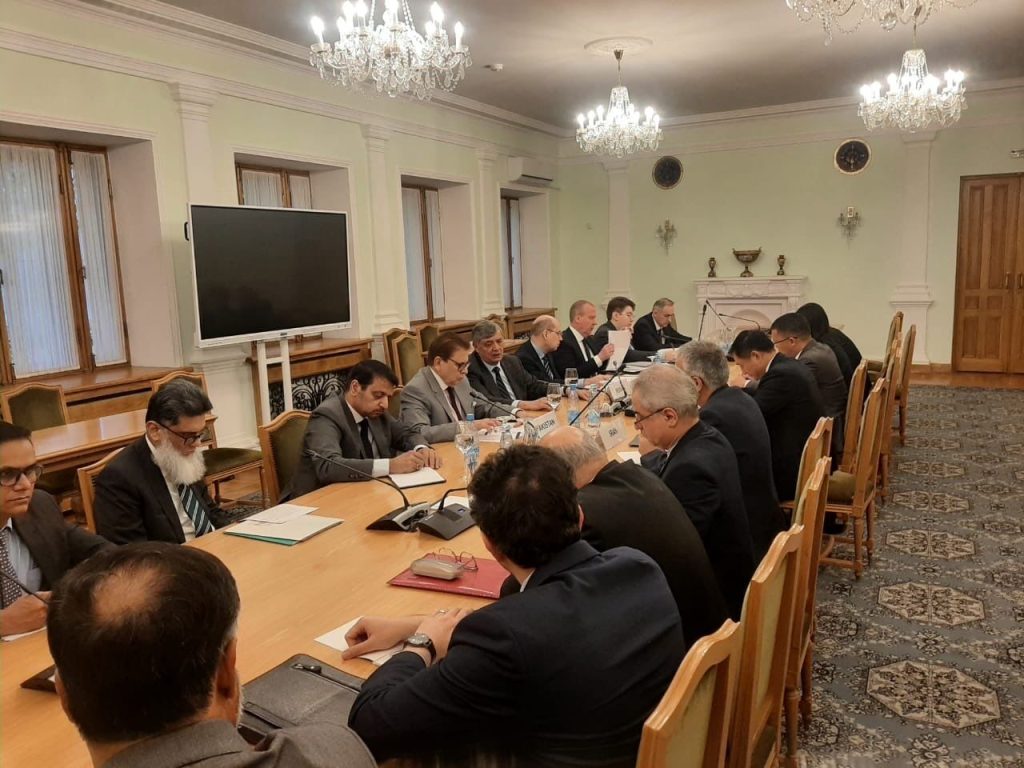The Pakistan, China, Russia, and Iran Reaffirm Commitment to a Peaceful and Terror-Free Afghanistan at Moscow Meeting marked another significant step in regional diplomacy as the Quadrilateral Meeting of Special Representatives for Afghanistan convened in Moscow on Tuesday. Representatives from the four countries pledged to strengthen cooperation for regional peace and security, stressing their collective resolve to prevent Afghanistan from once again becoming a haven for terrorism.
Pakistan’s Special Representative for Afghanistan, Ambassador Mohammad Sadiq, stated on X that the participating countries “unanimously reaffirmed their steadfast commitment to a stable, sovereign, and peaceful Afghanistan, free from the scourge of terrorism and external interference.” He added that the continued presence of banned terrorist organisations such as Tehreek-e-Taliban Pakistan (TTP), Balochistan Liberation Army (BLA), Eastern Turkistan Islamic Movement (ETIM), Jaish al-Adl, Daesh, and al-Qaeda was a shared concern among all participating states.
Ambassador Sadiq emphasised that the countries agreed on the need for enhanced coordination and collective action to combat terrorism in all its forms. The Moscow consultations reinforced the shared objective of ensuring Afghanistan does not revert to a sanctuary for militant networks, highlighting that sustainable peace requires long-term regional cooperation and mutual trust.
On the sidelines of the quadrilateral meeting, Ambassador Sadiq held several bilateral engagements with his counterparts. He described his meeting with Iranian Special Representative Muhammad Reza Bahrami as “great,” noting that both sides discussed the latest developments in Afghanistan and reaffirmed their commitment to addressing common security challenges through dialogue and coordination. He added that Pakistan and Iran agreed to explore new avenues for strengthening bilateral cooperation and promoting regional stability.
Ambassador Sadiq also met with China’s Special Representative for Afghanistan, Ambassador Yue Xiaoyong, describing their discussion as “productive.” The two diplomats reviewed regional security issues, counter-terrorism cooperation, and humanitarian concerns in Afghanistan, stressing the importance of a unified regional approach to sustain peace and development. He said the meeting reaffirmed the strong partnership between Pakistan and China in addressing shared challenges and advancing regional development initiatives.
In another key engagement, Ambassador Sadiq met with Russia’s Special Representative for Afghanistan, Ambassador Zamir Kabulov, to discuss strategies for strengthening regional collaboration. Pakistan’s Ambassador to Kabul, Ubaid ur Rahman Nizamani, also attended the meeting, which focused on practical steps for stabilising Afghanistan through joint diplomatic and counter-terrorism efforts.
The quadrilateral consultations come amid Pakistan’s renewed call for the Taliban administration in Kabul to take decisive and verifiable action against terrorist outfits operating from Afghan soil. Prime Minister Shehbaz Sharif recently cautioned that Afghanistan “must choose between siding with terrorists or standing with Pakistan,” reiterating Islamabad’s policy of zero tolerance toward militancy and Indian-sponsored proxies.
Earlier this year, during the sixth Trilateral Foreign Ministers’ Dialogue in Kabul, Pakistan, China, and Afghanistan reaffirmed their commitment to deepen cooperation in counter-terrorism, trade, transit, and development. The discussions also covered expanding the China–Pakistan Economic Corridor (CPEC) into Afghanistan to strengthen economic connectivity across the region.
Deputy Prime Minister Ishaq Dar had similarly urged the Afghan authorities to take “concrete and verifiable measures” against groups such as the TTP, BLA, and Majeed Brigade, reinforcing Pakistan’s commitment to regional peace, security, and collective stability.
The Pakistan, China, Russia, and Iran Reaffirm Commitment to a Peaceful and Terror-Free Afghanistan at Moscow Meeting reflects a growing consensus among regional powers that only through cooperation and mutual security assurances can lasting peace in Afghanistan—and by extension, South and Central Asia—be achieved.


